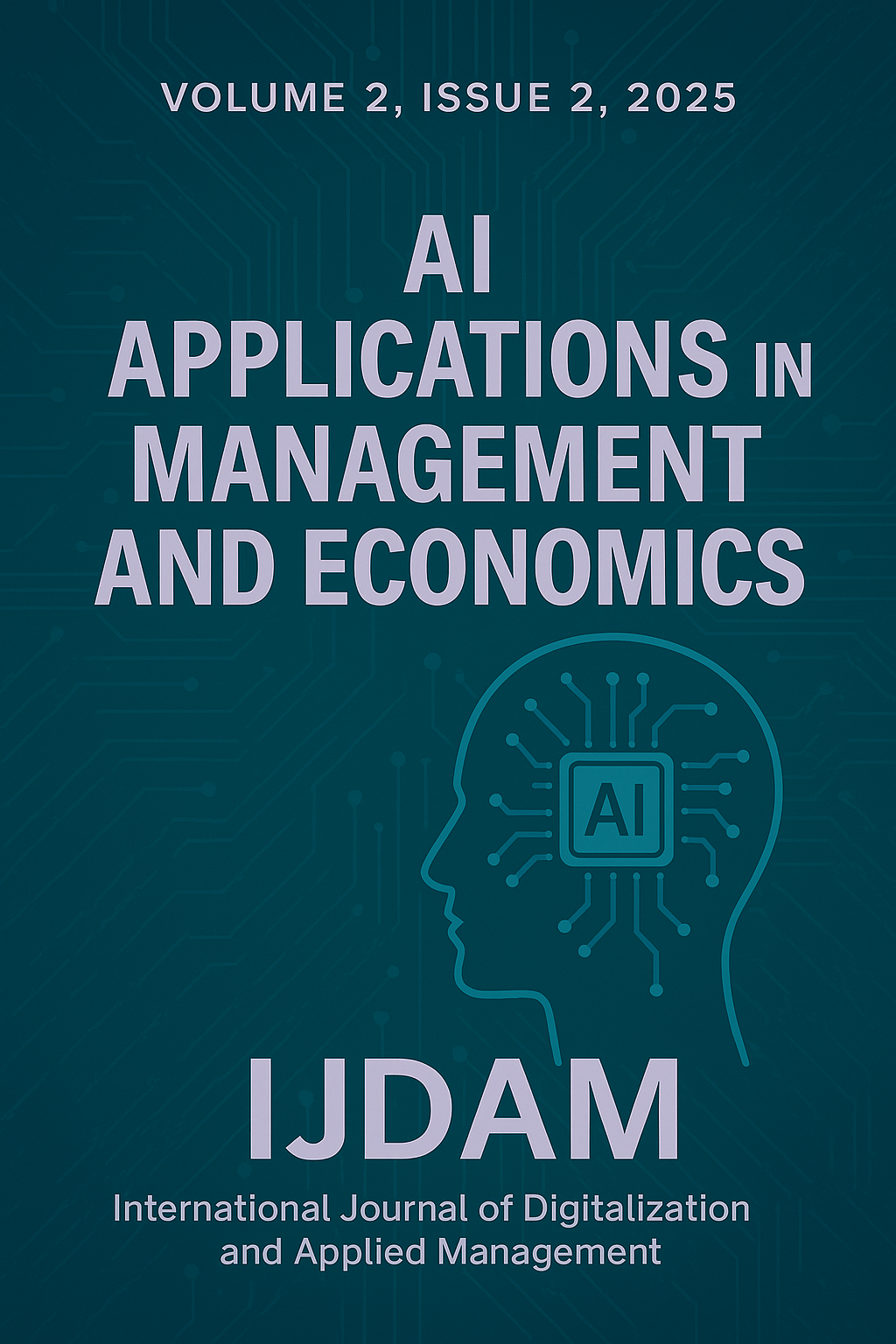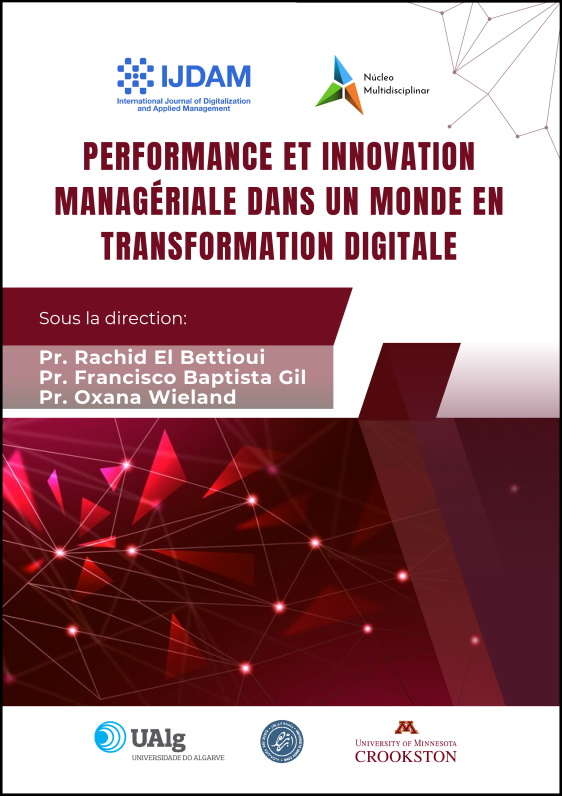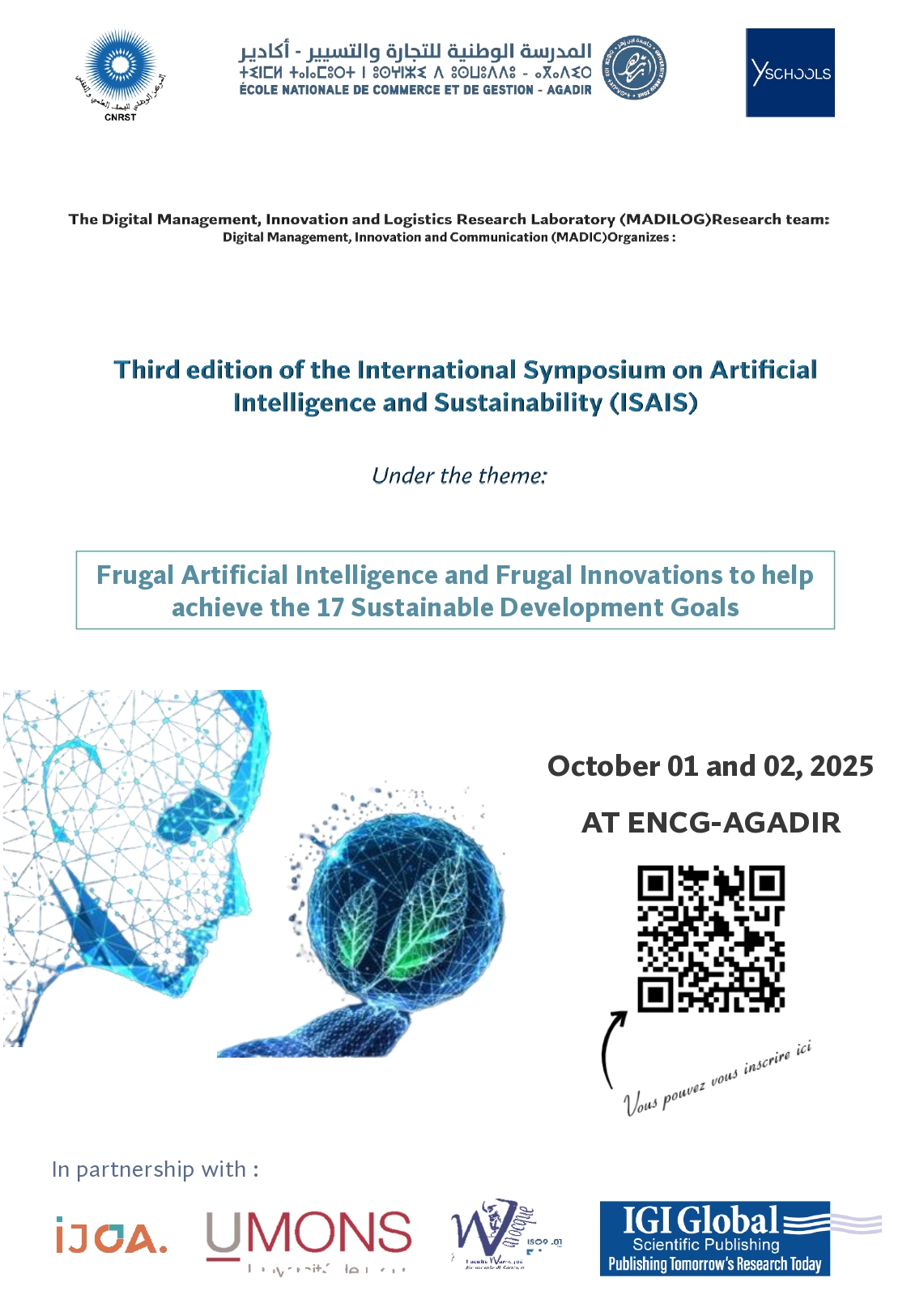Le leadership humble des équipes de projets africains à l’épreuve du succès des projets de développement international (PDI)
rôle médiateur de l’apprentissage organisationnel
DOI:
https://doi.org/10.23882/ijdam.25154Palavras-chave:
Apprentissage organisationnel, humilité de l’équipe , projet de développement internationaux, succès des projets.Resumo
Le présent papier a pour objectif d’examiner la relation entre le leadership humble de l’équipe de projet et le succès des projets de développement international en intégrant l’apprentissage organisationnel comme variable médiatrice. Cette recherche s’appuie sur une base de données collectées à travers un questionnaire auprès de 106 membres des équipes de projets de développement international au Sénégal. La méthode d’équations structurelles basée sur la variance, dont l’approche des moindres carrés partiels (PLS) a été utilisée pour tester les hypothèses de recherche. Les résultats de cette étude ont révélé que le leadership humble de l’équipe est positivement lié au succès des projets de développement international. En outre, l’apprentissage organisationnel joue un rôle médiateur dans la relation entre le leadership humble de l’équipe et le succès des projets de développement international. Enfin, cette étude présente une perspective originale sur le rôle du leadership humble de l’équipe dans la réussite des projets et l’impact de l’apprentissage organisationnel.
Referências
Aga, D. A., Noorderhaven, N., & Vallejo, B. (2016b). Transformational leadership and project success : The mediating role of team-building. International Journal of Project Management, 34(5), 806‑818. https://doi.org/10.1016/j.ijproman.2016.02.012
Argyris, C., & Schön, D. A. (1997). Organizational learning: A theory of action perspective. Reis, (77/78), 345-348.
Ali, M., Zhang, L., Shah, S. J., Khan, S., & Shah, A. M. (2020). Impact of humble leadership on project success : The mediating role of psychological empowerment and innovative work behavior. Leadership & Organization Development Journal, 41(3), 349‑367. https://doi.org/10.1108/LODJ-05-2019-0230
Ali, Muazam, and Farooq Rasheed. "Transformational leadership and project success: The mediating role of effective-communication." (2020).
Alvarenga, J. C., Branco, R. R., Guedes, A. L. A., Soares, C. A. P., & Silva, W. D. S. E. (2019). The project manager core competencies to project success. International Journal of Managing Projects in Business, 13(2), 277‑292. https://doi.org/10.1108/IJMPB-12-2018-0274
Baron, R. M., & Kenny, D. A. (1986). The moderator–mediator variable distinction in social psychological research : Conceptual, strategic, and statistical considerations. Journal of Personality and Social Psychology, 51(6), 1173‑1182. https://doi.org/10.1037/0022-3514.51.6.1173
Belassi, W., & Tukel, O. I. (1996). A new framework for determining critical success/failure factors in projects. International Journal of Project Management, 14(3), 141‑151. https://doi.org/10.1016/0263-7863(95)00064-X
Cheng, C., Bartram, T., Karimi, L., & Leggat, S. (2016). Transformational leadership and social identity as predictors of team climate, perceived quality of care, burnout and turnover intention among nurses. Personnel Review, 45(6), 1200‑1216. https://doi.org/10.1108/PR-05-2015-0118
Gasik, S. (2016). Are Public Projects Different than Projects in other Sectors? Preliminary Results of Empirical Research. Procedia Computer Science, 100, 399‑406. https://doi.org/10.1016/j.procs.2016.09.175
Gasik, S. (2023). Some insights on the future of project management in public administration. Revista de Gestão e Projetos, 14(3), 27‑39. https://doi.org/10.5585/gep.v14i3.25043
Gerlach, A. J., Jenkins, E., & Hodgson, K. (2019). Disrupting assumptions of risky play in the context of structural marginalization : A community engagement project in a Canadian inner-city neighbourhood. Health & Place, 55, 80‑86. https://doi.org/10.1016/j.healthplace.2018.11.008
Golini, R., Kalchschmidt, M., & Landoni, P. (2015). Adoption of project management practices : The impact on international development projects of non-governmental organizations. International Journal of Project Management, 33(3), 650‑663. https://doi.org/10.1016/j.ijproman.2014.09.006
Godenhjelm, S., Lundin, R. A., & Sjöblom, S. (2015). Projectification in the public sector–the case of the European Union. International Journal of Managing Projects in Business, 8(2), 324-348.
Hassan, M. M., Bashir, S., & Abbas, S. M. (2017). The Impact of Project Managers’ Personality on Project Success in NGOs : The Mediating Role of Transformational Leadership. Project Management Journal, 48(2), 74‑87. https://doi.org/10.1177/875697281704800206
Hodgson, D., Fred, M., Bailey, S., & Hall, P. (Eds.). (2019). The projectification of the public sector. Routledge.
Huber, G. P. (1991). Organizational Learning: The Contributing Processes and the Literatures. Organization Science, 2(1), 88‑115. https://doi.org/10.1287/orsc.2.1.88
Ika, L. A., Diallo, A., & Thuillier, D. (2012). Critical success factors for World Bank projects: An empirical investigation. International Journal of Project Management, 30(1), 105‑116. https://doi.org/10.1016/j.ijproman.2011.03.005
Ika, L. A., Söderlund, J., Munro, L. T., & Landoni, P. (2020). Cross-learning between project management and international development : Analysis and research agenda. International Journal of Project Management, 38(8), 548‑558. https://doi.org/10.1016/j.ijproman.2020.10.005
Ika, L., & Paché, G. (2021). Performance des grands projets : deux conférences comportementales. Management & Data science, 5 (4).
Ika, L., & Saint-Macary, J. (2023). Managing fuzzy projects in 3D: a proven, multi-faceted blueprint for overseeing complex projects. McGraw Hill Professional.
Khattak, S. I., Rizvi, T. H., & Khan, M. A. (2022). Unwrapping Software Projects Success in Asia : Assessing the Role Of Authentic Leadership, Psychological Empowerment, and Job Engagement in Project Success Using a Serial-Mediation Approach. SAGE Open, 12(2), 215824402210979. https://doi.org/10.1177/21582440221097918
Kœnig, G. (2015). L’apprentissage organisationnel : Repérage des lieux. Revue Française de Gestion, 41(253), 83‑95. https://doi.org/10.3166/RFG.160.293-328
Kostadinović, I., & Stanković, S. (2021). Organizational Learning and Innovation in the Tourism Industry as a Basis for Creating Value for Tourists. Economic Themes, 59(1), 153‑172. https://doi.org/10.2478/ethemes-2021-0009
Landoni, P., & Corti, B. (2011). The Management of International Development Projects : Moving toward a Standard Approach or Differentiation? Project Management Journal, 42(3), 45‑61. https://doi.org/10.1002/pmj.20231
Li, J., Liang, Q., Zhang, Z., & Wang, X. (2018). Leader humility and constructive voice behavior in China : A dual process model. International Journal of Manpower, 39(6), 840‑854. https://doi.org/10.1108/IJM-06-2017-0137
Li, Y., Sun, T., Shou, Y., & Sun, H. (2020a). What Makes a Competent International Project Manager in Emerging and Developing Countries? Project Management Journal, 51(2), 181‑198. https://doi.org/10.1177/8756972820901387
Li, Y., Sun, T., Shou, Y., & Sun, H. (2020b). What Makes a Competent International Project Manager in Emerging and Developing Countries? Project Management Journal, 51(2), 181‑198. https://doi.org/10.1177/8756972820901387
Mazouz, B. (2017). Gestion de projets en contexte public. PUQ.
Müller, R., & Turner, R. (2010). Leadership competency profiles of successful project managers. International Journal of Project Management, 28(5), 437‑448. https://doi.org/10.1016/j.ijproman.2009.09.003
Nieto-Rodriguez, A. (2021). Harvard business review project management handbook: how to launch, lead, and sponsor successful projects. Harvard Business Press.
Orth, D. and Schuldis, P.M. (2021), "Organizational learning and unlearning capabilities for resilience during COVID-19", The Learning Organization, Vol. 28 No. 6, pp. 509-522. https://doi.org/10.1108/TLO-07-2020-0130
Ou, A. Y., Tsui, A. S., Kinicki, A. J., Waldman, D. A., Xiao, Z., & Song, L. J. (2014). Humble Chief Executive Officers’ Connections to Top Management Team Integration and Middle Managers’ Responses. Administrative Science Quarterly, 59(1), 34‑72. https://doi.org/10.1177/0001839213520131
Owens, B. P., & Hekman, D. R. (2012). Modeling How to Grow : An Inductive Examination of Humble Leader Behaviors, Contingencies, and Outcomes. Academy of Management Journal, 55(4), 787‑818. https://doi.org/10.5465/amj.2010.0441
Owens, B. P., & Hekman, D. R. (2016a). How Does Leader Humility Influence Team Performance? Exploring the Mechanisms of Contagion and Collective Promotion Focus. Academy of Management Journal, 59(3), 1088‑1111. https://doi.org/10.5465/amj.2013.0660
Owens, B. P., Johnson, M. D., & Mitchell, T. R. (2013). Expressed Humility in Organizations : Implications for Performance, Teams, and Leadership. Organization Science, 24(5), 1517‑1538. https://doi.org/10.1287/orsc.1120.0795
Picciotto, R. (2020). Towards a ‘New Project Management’ movement? An international development perspective. International Journal of Project Management, 38(8), 474‑485. https://doi.org/10.1016/j.ijproman.2019.08.002
Rego, A., Owens, B., Leal, S., Melo, A. I., Cunha, M. P. e, Gonçalves, L., & Ribeiro, P. (2017a). How leader humility helps teams to be humbler, psychologically stronger, and more effective : A moderated mediation model. The Leadership Quarterly, 28(5), 639‑658. https://doi.org/10.1016/j.leaqua.2017.02.002
Remy, K. and Sané, S. (2023), "The effect of humble leadership on the success of international development projects: the mediating role of organizational learning", The Learning Organization, Vol. ahead-of-print No. ahead-of-print. https://doi.org/10.1108/TLO-06-2022-0076
Scott-Young, C. M., Georgy, M., & Grisinger, A. (2019). Shared leadership in project teams : An integrative multi-level conceptual model and research agenda. International Journal of Project Management, 37(4), 565‑581. https://doi.org/10.1016/j.ijproman.2019.02.002
Serrador, P., & Turner, R. (2015). The Relationship between Project Success and Project Efficiency. Project Management Journal, 46(1), 30‑39. https://doi.org/10.1002/pmj.21468
Song-Naba, F. (2017). Démarche qualité et apprentissage organisationnel dans les PME de transformation agroalimentaire au Burkina Faso: RIMHE : Revue Interdisciplinaire Management, Homme & Entreprise, n° 27, 6(3), 29‑58. https://doi.org/10.3917/rimhe.027.0029
Swain, J., & Korenman, L. (2018). In their humble opinion : How expressions of humility affect superiors’ assessments of leadership potential in the US Army. Military Psychology, 30(6), 507‑527. https://doi.org/10.1080/08995605.2018.1503002
Wang, Y., Liu, J., & Zhu, Y. (2018). Humble Leadership, Psychological Safety, Knowledge Sharing, and Follower Creativity : A Cross-Level Investigation. Frontiers in Psychology, 9, 1727. https://doi.org/10.3389/fpsyg.2018.01727
Wolfteich, C. E., Ruffing, E. G., Crabtree, Sarah. A., Devor, N. G., & Sandage, S. J. (2021). Humility and religious leadership : A qualitative study of theology and practice. Journal of Spirituality in Mental Health, 23(3), 231‑254. https://doi.org/10.1080/19349637.2019.1691967
Ye, B. H., Tung, V. W. S., Li, J. J., & Zhu, H. (2020). Leader humility, team humility and employee creative performance : The moderating roles of task dependence and competitive climate. Tourism Management, 81, 104170. https://doi.org/10.1016/j.tourman.2020.104170
Zaman, U., Nawaz, S., Tariq, S., & Humayoun, A. A. (2019). Linking transformational leadership and “multi-dimensions” of project success : Moderating effects of project flexibility and project visibility using PLS-SEM. International Journal of Managing Projects in Business, 13(1), 103‑127. https://doi.org/10.1108/IJMPB-10-2018-0210
Zang, Z. et Song, P. (2020), "multi-level effects of humble leadership on employees" work well-being: the roles of psychological safety and error management climate" Frontiers in Psychology, Vol.11,571840.
Downloads
Publicado
Como Citar
Edição
Secção
Licença
Direitos de Autor (c) 2025 Kesner REMY

Este trabalho encontra-se publicado com a Creative Commons Atribuição-NãoComercial 4.0.


 Portugal
Portugal











